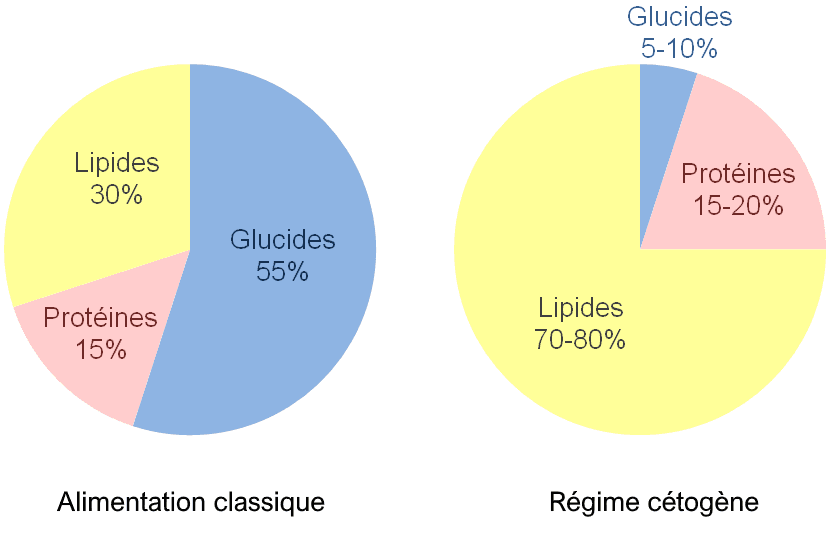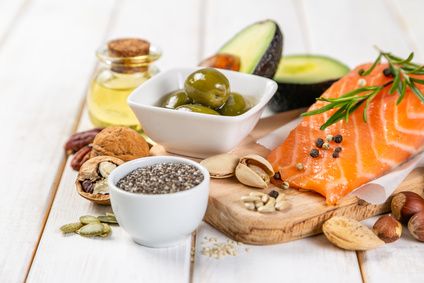The ketogenic diet allows you to lose weight quickly and sustainably
Originally developed to treat people with epilepsy, the ketogenic diet or "keto diet" consists of eating fat and depriving yourself of carbohydrates. It would allow you to lose weight quickly and permanently. What is it actually? Is it really effective? How to practice it? Explanations.
What is the ketogenic diet?
Overweight and obesity have reached levels never seen before in our Western societies. The proportion of overweight people in the world and in Europe in particular has led the WHO to qualify this problem as an epidemic. In fact, about one in two adults and one in three children are overweight or obese according to the latest figures from the organization. Faced with this problem and the urgency to reverse the trend, diets for weight loss have gained popularity very quickly.
And among the most famous, the ketogenic diet is a name that comes up often. Basically this special diet was intended to treat patients with epilepsy. But it was quickly acclaimed by many specialists for its ability to lose weight quickly and sustainably while improving health and athletic performance in general.
How does a ketogenic diet ultimately work? What is its scope? And above all, what are the limits?
Ketosis is the basis of how the ketogenic diet works
Also called the keto diet , the ketogenic diet is based on a diet consisting mainly of fat (at least 70% of the diet) and foods without or containing very little carbohydrate . In a ketogenic diet, the diet is 70-80% fat, 15-20% protein, and 5-10% carbohydrate.

The keto diet is based on a special metabolism in the body to cause weight loss in a sustainable way. This is the metabolic state called ketosis .
On the scale of human evolution, the control of agriculture and breeding is fairly recent. In the past, periods of scarcity and abundance followed one another with the seasons. To survive during difficult times, nature has equipped humans with a formidable auxiliary generator which allows them to draw a good part of their energy from their own fat reserves.
Body fat therefore becomes the body's main fuel, replacing glucose from carbohydrates. This is one of the main reasons for the significant weight loss observed at the end of difficult seasons.
From a metabolic point of view, ketosis is therefore a natural state of the human body where it changes its main source of energy. The ketogenic diet aims to force the body to use a different type of fuel. Instead of depending on sugar (glucose) from carbohydrates (grains, legumes, vegetables and fruits), it now gets its energy from ketones. It is a type of fuel that the liver produces from stored fat.
Low carb = keto diet?
In the world of diets, low carb and high protein diets are very popular. The Paleo, South Beach, and Atkins diets all fall into this category. It is also often referred to as a ketogenic diet.
But there is a real difference between this type of low carb diet and a proper ketogenic diet. Indeed, while in a ketogenic diet the percentage of carbohydrates should not exceed 5-10%, most low carb diets are content to reduce the amount of carbohydrates consumed, without setting a predefined percentage and so low.
Improve your sports performance
Since this special diet prompts the body to burn its own fat to meet its needs, it is a great way to lose weight. Many studies on the subject have also found very good results in the short term.

Many motivations drive athletes to want to lose weight: improving the weight / power ratio, competing in a more favorable weight category or, in the case of an activity such as weight training, burning as much body fat as possible for aesthetic reasons. while maintaining muscle mass. In this sense, the ketogenic diet has the major advantage of enabling rapid weight loss without the ill effects known to other rapid weight loss methods.
But ketogenic diets aren't just for weight loss. Many athletes participating in endurance disciplines also turn to these very low carbohydrate, high fat diets to improve performance. By forcing muscles to use fat instead of sugar, athletes gain a much greater energy reserve, allowing them to avoid the “wall” that lies in wait for them when glycogen stores are depleted.
According to a study conducted by Paoli Antonio et al, the ketogenic diet appears to have many advantages over many other types of energy restrictive diets. Even for a few days, these can create situations of deficiency or imbalance in essential nutrients (vitamins, minerals, essential fatty acids and amino acids) that help control oxidative stress and inflammatory processes. A well-conducted ketogenic diet with sufficient amounts of protein (minimum 1.3-1.5 g / kg bodyweight) is not an "extreme" diet, despite low carbohydrate levels (<20 g of carbohydrates per day). It therefore does not cause metabolic imbalances which may have irreversible effects.
But it's not a miracle cure
Recent research suggests that athletes who participate in high intensity, short duration sports may experience a drop in performance while on a ketogenic diet.
Researchers at the University of St. Louis tested the anaerobic exercise performance of 16 men and women on a ketogenic diet or high-carbohydrate diet for four days.
People who follow a ketogenic diet perform less well on anaerobic exercise tasks than those who consume more carbohydrates. Depending on the exercise, their performance was 4-15% lower than in the high-carbohydrate diet group.
According to study author Edward Weiss, associate professor of nutrition and dietetics at the University of Saint-Louis, these results therefore rule out athletes in sports who depend on short-lived anaerobic activities. This includes the sprint-like activities that occur in soccer and basketball as well as short and intense activities like the 100-meter sprint and the triple jump etc.
Note, however, that some athletes report having seen improvements in their performance with a diet free of carbohydrates. Ketogenic diets could therefore be useful, in certain circumstances, for people who know what they are doing and why they are doing it. If you are in this situation and are feeling good, then there is no reason to change it. For others, a low carb diet rather than a ketogenic diet might be the answer.
In practice: somewhat special rules
All in all, the ketogenic diet is a great way to lose weight fast. But its implementation requires some understanding of how the human body works.
- This first requires a significant reduction in carbohydrate intake. That is, between 20 and 50 grams of carbohydrates per day (it should be noted that an average size banana contains around 27 grams of carbohydrate).
- It usually takes a few days to reach a state of ketosis.
- Eating too much protein can interfere with ketosis.

Due to the high amount of fat that the keto diet requires, those who decide to follow it should eat it with every meal. In a 2,000 calorie daily diet, this works out to about 165 grams of fat, 40 grams of carbohydrate, and 75 grams of protein. However, the exact ratio depends on individual needs.
All healthy unsaturated fats are allowed in the ketogenic diet. These include nuts (almonds, walnuts), seeds, avocado, tofu, olive oil, etc.
Although saturated fat is not prohibited, it is recommended to limit consumption because of its suspected link to cardiovascular disease.
Anyway, excess in everything harms. Care should therefore be taken to properly vary the sources of lipid supply with healthy products. Some research also points to the stress that this very long-term diet could cause on the liver. This is indeed very active throughout the process.
In conclusion
The ketogenic diet has been shown to be effective as a performance boosting diet for endurance athletes as well as a special diet that promotes weight loss and the maintenance of muscle mass.
For high intensity and short duration athletes, this diet seems, on the contrary, to have a rather negative impact on the results. A low carb rather than a ketogenic diet could then be a solution. A low carb diet can also be preferred in the long term because it is less restrictive and easier to maintain.
To Get Started With The Keto Diet Have Look At The Custom Keto Meal Plan.
A hightly poplular program that provides you with many different easy daily keto recipes, as well as an 8-week customized meal plan and a lot of uncomplcated written information about the keto diet.

No comments:
Post a Comment